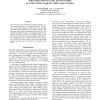75 search results - page 6 / 15 » Learning in BDI Multi-agent Systems |
123
Voted
ATAL
2004
Springer
15 years 7 months ago
2004
Springer
Product Distribution (PD) theory was recently developed as a framework for analyzing and optimizing distributed systems. In this paper we demonstrate its use for adaptive distribu...
128
Voted
KR
2010
Springer
15 years 5 months ago
2010
Springer
We investigate a class of first-order temporal epistemic logics for the specification of multi-agent systems. We consider well-known properties of multi-agent systems including ...
156
click to vote
KBSE
2002
IEEE
15 years 6 months ago
2002
IEEE
Engineering individual components of a multi-agent system and their interactions is a complex and error-prone task in urgent need of methods and tools. Prototyping is a valuable t...
103
Voted
ATAL
2003
Springer
15 years 7 months ago
2003
Springer
People can interact much more readily with a multi-agent system if they can understand it in cognitive terms. Modern work on “BDI agents” emphasizes explicit representation of ...
122
click to vote
ATAL
2004
Springer
15 years 7 months ago
2004
Springer
Product Distribution (PD) theory is a new framework for controlling Multi-Agent Systems (MAS’s). First we review one motivation of PD theory, as the information-theoretic extens...

